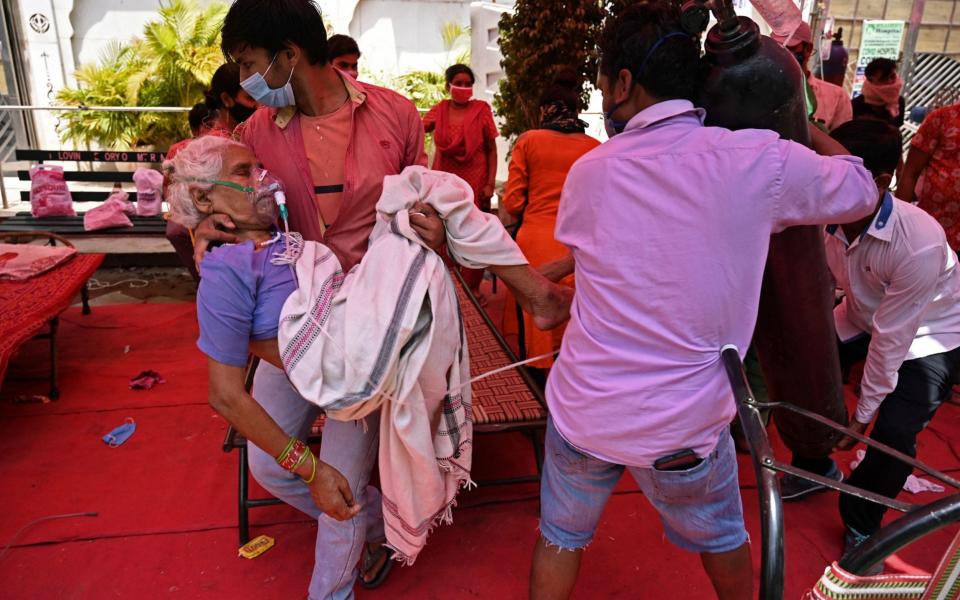Medical students to be sent to Covid frontlines as India’s hospitals face collapse

A shortage of health workers – on top of a lack of oxygen and hospital beds – is compounding India's fight against Covid-19, with trainee doctors and nurses set to be deployed on hospital front lines.
India's healthcare system has collapsed under the weight of a devastating second wave of the virus, and on Tuesday the country passed a milestone of 20 million cases, 10 million of which have been registered in the last four months.
India also recorded more than 300,000 new Covid-19 cases for the 13th consecutive day, but the actual figures are believed to be 10 times higher due to a nationwide lack of testing.
Now doctors say there are not enough trained health workers to cope with the sheer number of patients requiring hospitalisation.
“We have stretched ourselves as much as we can. We initially had 40 Covid-19 ICU beds for patients but even a 40 per cent expansion wasn’t enough and we are operating far beyond our capacity on every ward,” said Dr Sumit Ray, medical superintendent at Holy Family Hospital in Delhi.
“With our professionals also falling sick, we have gone from a ratio of two nurses for every three patients to one nurse for four patients and with that kind of ratio it is impossible to provide quality care in an ICU.”
India’s chronically underfunded public healthcare system already faced a shortage of 600,000 doctors and two million nurses before the pandemic struck.
At least 747 doctors have since died from Covid-19, while many other professionals have had to take time off to quarantine after contracting the virus.
In a last-ditch attempt to combat staffing shortages, the Indian government has announced final-year undergraduates will provide online consultations and monitor mild cases, while trainees will complete Covid-19 management duties.
The final qualifying exam for India’s trainee doctors will be pushed back until August 31 to allow professionals to focus on treating Covid-19 patients.
Medical staff are also suffering from exhaustion and urgently require rest after working non-stop throughout April and being away from their families.
“At physical, mental and personal levels, doctors in India are fully traumatised and each doctor is doing the workload of around three people,” said Dr Harjit Singh Bhatti, President of the Progressive Medicos and Scientists Forum in Delhi.
“The workload is continually increasing while our manpower is decreasing, as many doctors contract the virus. We are scared that even if we get infected there is no one to save us, as hospitals can’t even provide oxygen to doctors.”
In the northern state of Bihar, staffing shortages have even resulted in new oxygen ventilators lying unused, as there are not enough staff to operate them.
On Tuesday, two Covid-19 patients in Bengaluru became the latest victims of hospital oxygen shortages, with facilities outside of Delhi increasingly running out of supplies.
A further 600 retired armed forces doctors will be sent to hospitals in Delhi, which has seen some of the country's most widespread oxygen shortages.
Covid-19 patients from India's capital are allegedly producing fake negative tests so they can travel to other parts of the country where there are more doctors and hospital beds.
There has been a slight decrease in the official number of new daily infections since India became the first nation to exceed 400,000 cases on Saturday.
But, it is "absolutely too soon" to claim India has reached the peak of its second wave as there is very limited data available, said Bhramar Mukherjee, professor of public health and epidemiology at the University of Michigan.
Crucially, many Indian states have only seen a slight reduction or plateau in the number of new cases as their daily testing rates have plummeted.
Meanwhile, the Indian Prime Minister, Narendra Modi, is facing calls from his own Covid-19 advisors and business leaders to impose a nationwide lockdown.
Leading opposition politician Rahul Gandhi has now added his voice to the chorus: "The only way to stop the spread of corona now is a full lockdown... Government of India's inaction is killing many innocent people."
Many Indian states are currently under localised curfews but Delhi is cautious to impose a nationwide lockdown after a similar measure last year pushed an estimated 400 million Indians into further poverty through loss of livelihoods.
Protect yourself and your family by learning more about Global Health Security
